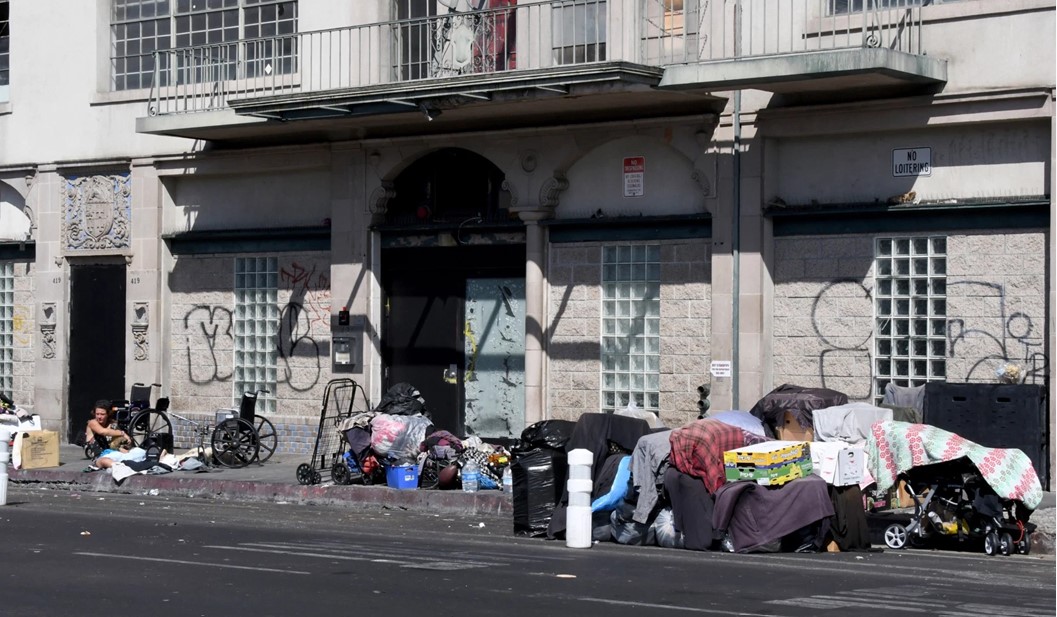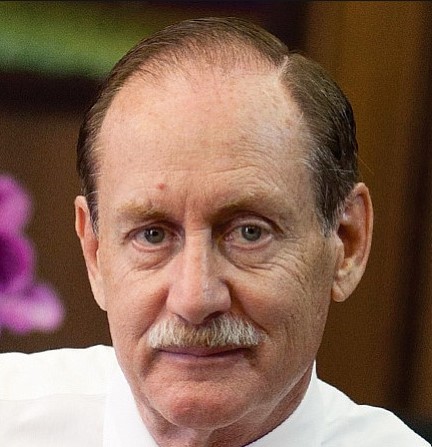Homelessness is a Manmade Disaster

Homeless people look toward the mission as those in need stand in line for prepackaged lunches and toiletries during the Midnight Mission’s Banquet of Hope Event Midnight Mission in Los Angeles on Friday, October 16, 2020. (Photo by Keith Birmingham, Pasadena Star-News/ SCNG)
Imagine a natural disaster striking Los Angeles. The epicenter is Downtown. Tens of thousands of our neighbors are displaced across the county. The magnitude of the catastrophe means government aid is sluggish. People begin erecting tents on sidewalks.
Years later, despite massive public spending, the tents are still there, 50,000 living without roofs, plumbing or safe places to cook their meals.
Of course you donʼt have to imagine it. We are living through a man-made disaster.
If there had been a massive earthquake, we would have found solutions. It would have required a huge mobilization of public, private and charitable efforts, but we would not have let down our neighbors. Homelessness is different.
Why? Three toxic emotions warp our reaction to tens of thousands of homeless people living on the streets: hostility, apathy and cynicism.
Hostility is everywhere on social media. It explodes when a site is proposed for a shelter or permanent supportive housing. It demonizes the homeless as dirty, degenerate and dangerous. Apathy is also widespread. Many simply accept homelessness as a feature of urban life, a sad but inevitable byproduct of a free- market economy. After all, didnʼt Jesus say, “The poor ye shall always have with you?” Cynicism is pervasive. The problem is too large, capitalism too ruthless, government too inefficient.
Hostility, apathy and cynicism cloud our judgment. There are solutions to homelessness. They arenʼt easy, cheap or popular. But endemic homelessness isnʼt either. Fifty thousand people living in makeshift camps and sleeping in doorways is a disaster for Los Angeles County. When disasters happen, Americans rise to the occasion. Ending homelessness will make us healthier, safer and more prosperous. Letʼs fix it.
The solutions are already in sight — we just donʼt have enough of them. Itʼs estimated that more than 80,000 people in L.A. County fell into homelessness during 2019. More than 50,000 actually found a way out with help from government and nonprofit services. Another 22,769 were placed in housing.
The biggest bottleneck for solving homelessness is building enough “permanent supportive housing.” Recovering from mental illness, addiction or family trauma means some people need more than just an apartment they can afford. But such housing and services are unwelcome and expensive. Overcoming neighborhood hostility, bringing down the cost and allocating more money are crucial to a lasting solution. Tall orders, but doable.
In the meantime, we need more temporary and transitional housing. “Tiny homes” and “pallet shelters” are better than tents on sidewalks, especially if they offer access to toilets, showers, hot meals and social services. Here again, the key is bringing down the cost, allocating more funding and finding sufficient sites.
We need better data and better organization. The sprawling “homeless industrial complex” is expensive and inefficient. Itʼs not rocket science to improve coordination and manage for results. The best way to secure more funding is to more effectively deploy the money weʼre already spending.
Government canʼt do it all. Nonprofits are stretched. We need more housed people to donate and volunteer. Like the fable of the child who rescued stranded starfish, anyone can make a difference. You can offer a job, help serve meals, rent an empty backhouse, or simply be a friend to assist someone getting back on their feet.
Hostility, apathy and cynicism wonʼt cure it. Compassion, caring and activism will. Instead of accepting homelessness as something we cannot change, itʼs time to change something we cannot accept.
Rick Cole is the former mayor of Pasadena and city manager of Azusa, Ventura and Santa Monica. He welcomes feedback at venturacole@yahoo.com.
Reprinted with the permission of the Pasadena Star-News.






